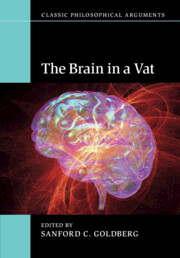Book contents
- Frontmatter
- Contents
- List of contributors
- Acknowledgments
- 1 Introduction: Putnam's reflections on the brain in a vat
- Part I Intentionality and the philosophy of mind and language
- Part II Epistemology
- 6 Putnam on BIVs and radical skepticism
- 7 New lessons from old demons: the case for reliabilism
- 8 BIVs, sensitivity, discrimination, and relevant alternatives
- Part III Metaphysics
- Bibliography
- Index
6 - Putnam on BIVs and radical skepticism
from Part II - Epistemology
Published online by Cambridge University Press: 05 June 2016
- Frontmatter
- Contents
- List of contributors
- Acknowledgments
- 1 Introduction: Putnam's reflections on the brain in a vat
- Part I Intentionality and the philosophy of mind and language
- Part II Epistemology
- 6 Putnam on BIVs and radical skepticism
- 7 New lessons from old demons: the case for reliabilism
- 8 BIVs, sensitivity, discrimination, and relevant alternatives
- Part III Metaphysics
- Bibliography
- Index
Summary
Putnam's BIV argument
A familiar way of arguing for radical skepticism is by appeal to radical skeptical hypotheses, such as the hypothesis that one might be a brain in a vat (BIV) which is being radically, and undetectably, deceived about its environment. Roughly, the skeptical argument goes that since such skeptical hypotheses are by their nature indistinguishable from normal experience, so one cannot know that they are false. Furthermore, if one cannot know that they are false, then it follows that one can't know much of what one believes, most of which is inconsistent with radical skeptical hypotheses.
This last step will almost certainly require some sort of closure-style principle, whereby knowledge is closed under known entailments. Thus, if one does have knowledge of the ‘everyday’ propositions which one takes oneself to know (e.g. that one has hands), and of the fact that these propositions entail the denials of radical skeptical hypotheses (e.g. the BIV hypothesis, because BIVs don't have hands), then one could come to know that one is not a BIV. Conversely, insofar as one grants that it is impossible to know that one is not a BIV, then it follows that one cannot know the everyday propositions which are known to be inconsistent with the BIV hypothesis either.
There are many ways of responding to radical skepticism of this form, which we will refer to as BIV skepticism. One might deny the relevant closure principle, for example, or one might put forward an epistemology according to which one could know the denials of radical skeptical hypotheses, and so on. On the face of it, Hilary Putnam's (1981b) famous argument against BIV skepticism would appear to be a variation on this last anti-skeptical strategy, in that he also seems to be, effectively, claiming that one can know that one is not a BIV.
The parallels between these two anti-skeptical approaches are superficial, however, and the differences significant. In particular, Putnam's overarching goal is not to make the epistemological claim that such anti-skeptical knowledge is possible, but rather to motivate the semantic claim that one cannot truly think the thought that one is a BIV. But these claims are logically distinct, in both directions. That one can know the denial of the BIV hypothesis is obviously consistent with the possibility that one can truly think the thought that one is a BIV.
- Type
- Chapter
- Information
- The Brain in a Vat , pp. 75 - 89Publisher: Cambridge University PressPrint publication year: 2016



